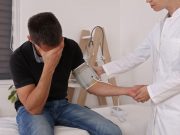Tag: Heart / Stroke-Related: High Blood Pressure
Phone Coaching, Home Monitoring Do Not Lead to Significant Change in Blood Pressure
However, telephone coaching and BP self-monitoring intervention resulted in increased physical activity, reduced dietary sodium intake, and increased home blood pressure monitoring
Alcohol Brief Intervention Can Improve Health Outcomes in HTN
Adults with hypertension had modest but significant reduction in drinks at 12 months and in BP at 18 months
Frequent Green Space Visits Linked to Lower Use of Certain Meds
Lower use of psychotropic, antihypertensive, and asthma medications observed; association attenuated by body mass index
Nighttime Hot Spring Bathing May Decrease Prevalence of HTN in Older Adults
Inverse relationship seen between habitual nighttime hot spring bathing and history of hypertension
Occurrence of Cardiovascular Events, Death Compared Between Thiazides
Occurrence of major cardiovascular events, non-cancer-related deaths no lower with chlorthalidone versus hydrochlorothiazide
High Coffee Intake Linked to CVD Mortality in Severe Hypertension
No association seen for people with optimal and normal BP, high-normal BP, grade 1 hypertension
Adding Yoga to Aerobic Training Lowers Blood Pressure
BP reduction greater with 15 minutes a day of yoga, five times a week for three months plus 30 minutes of aerobic training, compared with stretching control
Intervention Delivered Via Web-Based Platform Ups BP Control
Rate of BP control significantly higher after 12 months of multicomponent intervention, with reduction in SBP of −10.1 mmHg
Race, Ethnicity Not Linked to Timely Treatment of Peripartum HTN
However, Black, Asian, Hispanic women all more likely than White women to experience severe hypertension requiring treatment
More Than 12 Percent Develop De Novo Postpartum Hypertension
Risk for developing dn-PPHTN was increased for those aged 35 years or older, with caesarean delivery, for current or former smokers














